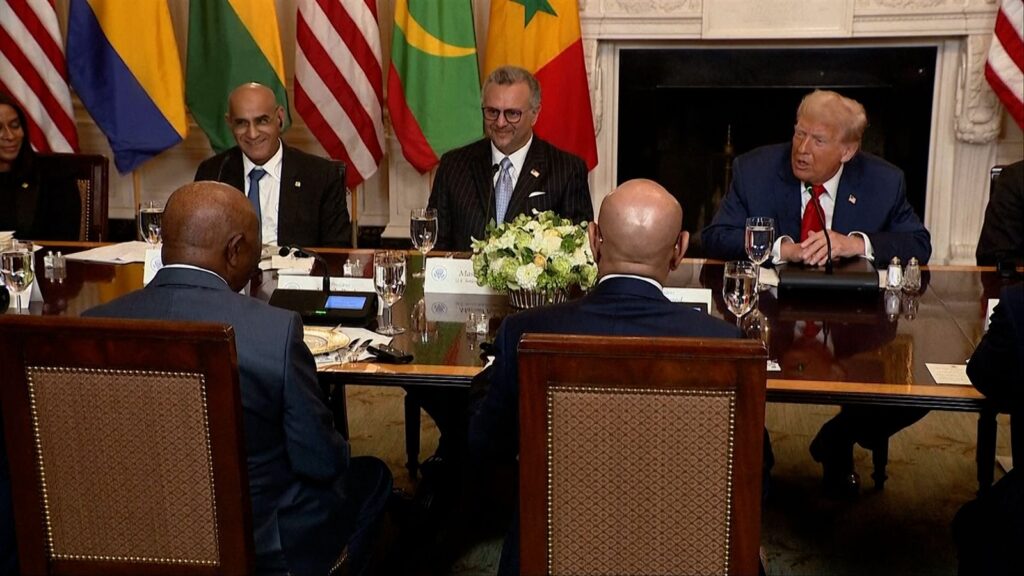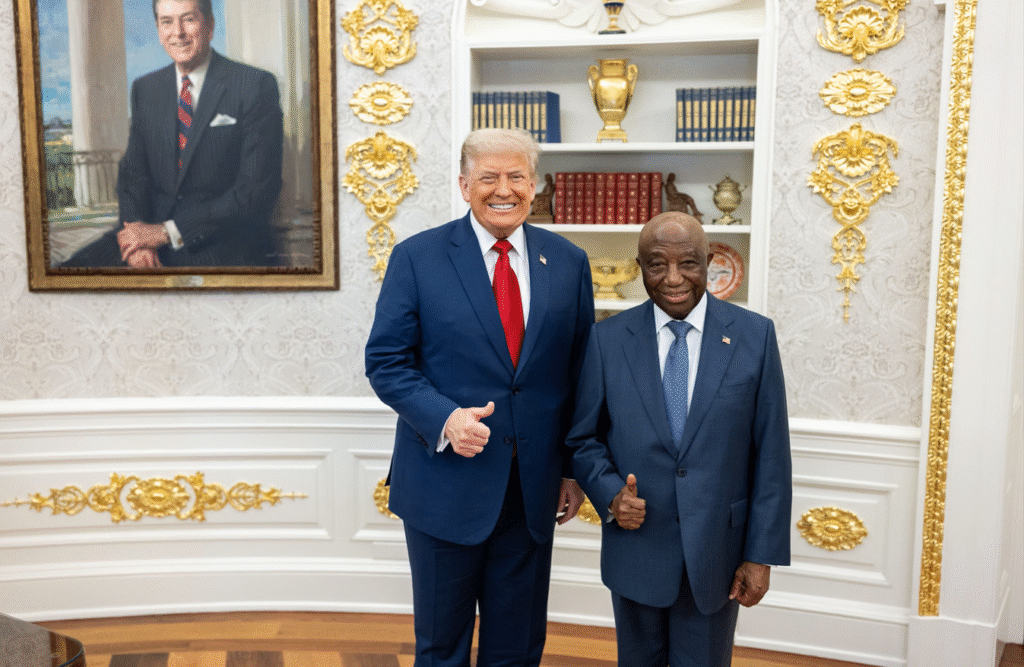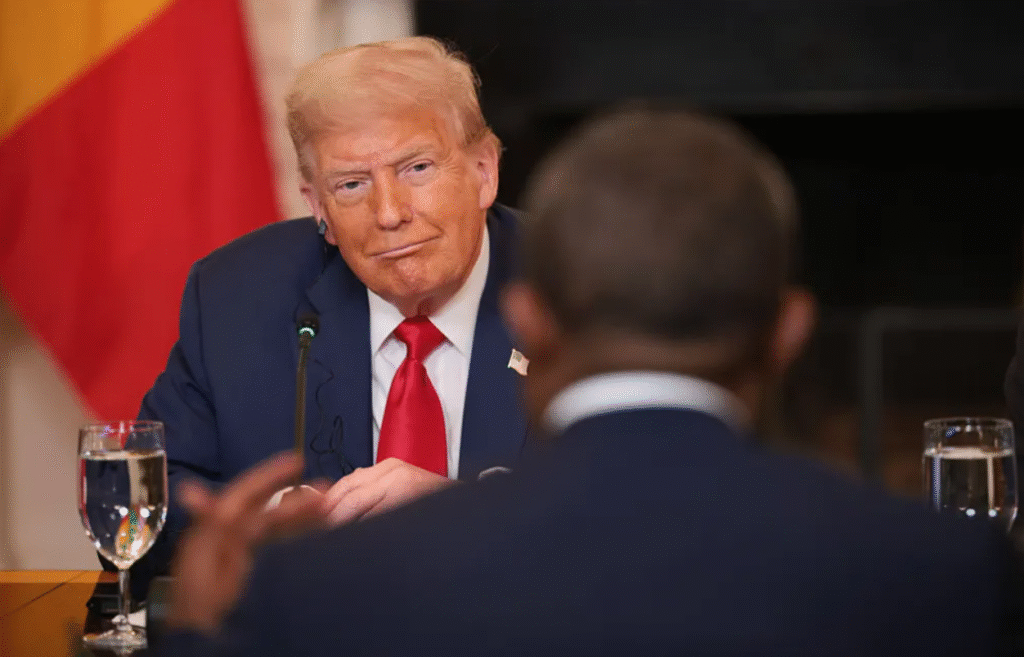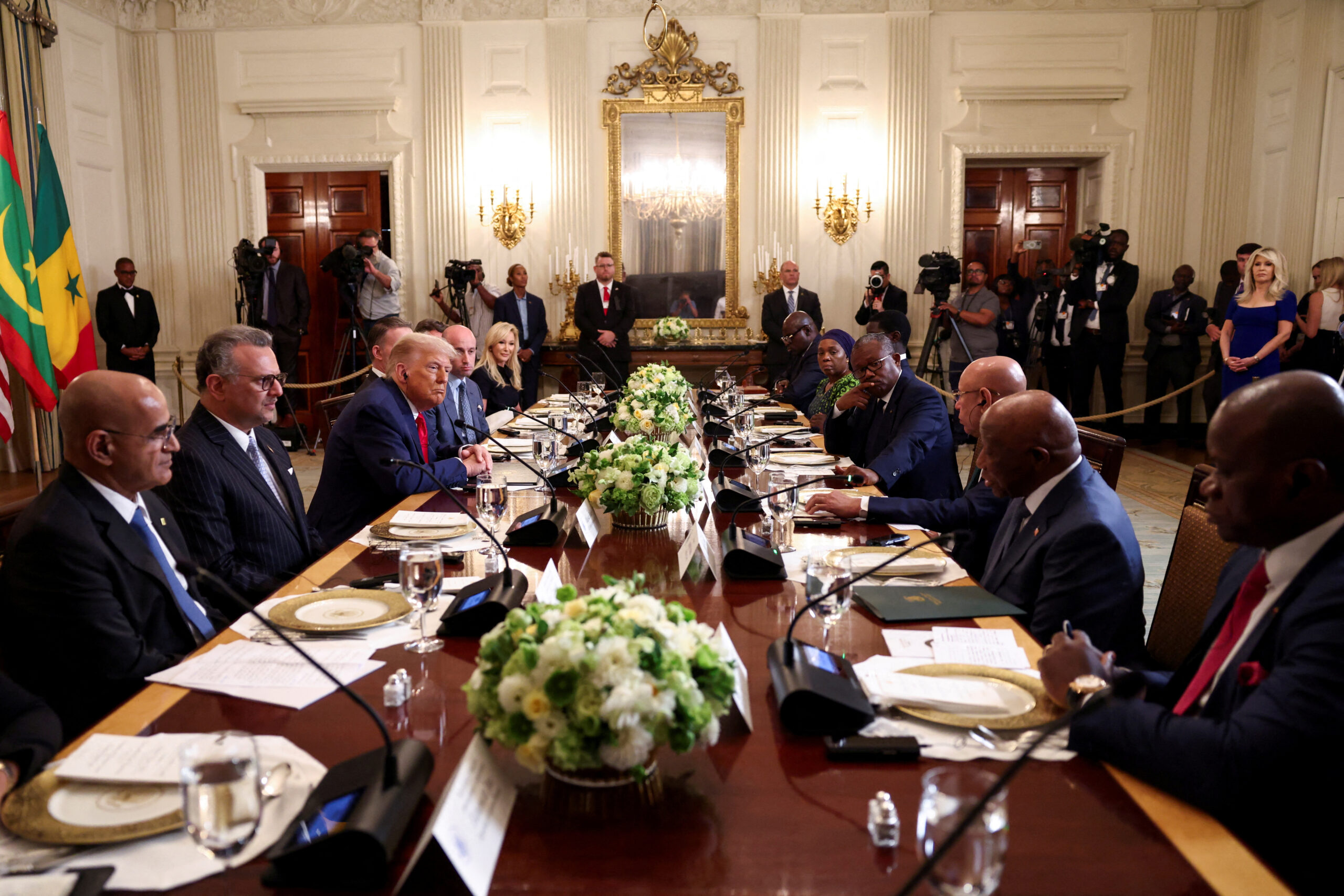During a White House lunch with African leaders, Donald Trump complimented Liberia’s president on his English, seemingly unaware that English is Liberia’s official language. The comment sparked widespread ridicule on social media.
A Compliment That Backfired
On a day meant to highlight diplomatic engagement between the United States and several West African nations, former U.S. President Donald Trump became the center of controversy once again—this time for an offhand remark that many considered both ignorant and condescending.
During a formal White House lunch with African leaders, Trump reportedly turned to Liberian President Joseph Boakai and praised his English, asking, “Such good English. Beautiful English. Where did you learn to speak so beautifully?”
Trump to Liberian President: "Such good English. Beautiful English. Where did you learn to speak so beautifully?"
— Politics Fact (@politicsfact1) July 9, 2025
English is the official language of Liberia pic.twitter.com/cqbdj06Wm3
What Trump likely intended as a compliment instantly triggered backlash online, as critics were quick to point out a glaring oversight—English is, in fact, the official language of Liberia.
A Viral Moment: Social Media Reacts
The clip of Trump’s comment spread across social media platforms like wildfire. Twitter, TikTok, and Instagram were flooded with reactions—ranging from disbelief to outright mockery.
Influencer Brian Krassenstein posted,
“Trump just praised the leader of Liberia for his English. ‘Where did you learn to speak so beautifully?’ FACT: English is the official language of Liberia. NATIONAL EMBARRASSMENT.”
BREAKING: Trump just praised the leader of Liberia for his English.
— Brian Krassenstein (@krassenstein) July 9, 2025
“Where did you learn to speak so beautifully?”
FACT: English is the official language of Liberia.
NATIONAL EMBARRASSMENT pic.twitter.com/ICqFaUidlx
Another user added,
“Trump to Liberian President: ‘Such beautiful English, where did you learn to speak English?’ This is embarrassing. Liberia’s official language is English.”
Trump to Liberian President: Such beautiful English, where did you learn to speak English?
— Anonymous (@YourAnon4ever) July 9, 2025
English is the official language of Liberia.
This is embarrassing. pic.twitter.com/WxCPnCqDhl
A third viral post read,
“Trump patronizingly asks the President of Liberia how he learned to speak English so beautifully. Trump, of course, has no idea that English is the official language of Liberia.”
BREAKING: Trump patronizingly asks the President of Liberia how he learned to speak English so beautifully.
— Trump Lie Tracker (Commentary) (@MAGALieTracker) July 9, 2025
Trump, of course, has no idea that English is the official language of Liberia. pic.twitter.com/d9zVMhrt5F
For many online commentators, the moment was not just about a simple factual error but also emblematic of a larger pattern of cultural insensitivity and ignorance that has dogged Trump throughout his political career.
Liberia: An American Legacy on African Soil
To understand why Trump’s remark struck such a nerve, one must first understand Liberia’s unique historical relationship with the United States.
Liberia isn’t just any African country with English as a colonial leftover. It was founded by freed African Americans in the 19th century. Back in 1822, the American Colonization Society helped establish Liberia as a haven for freed Black people from the U.S. who sought to build a life free from slavery and systemic racism.

By 1847, Liberia had declared its independence, becoming Africa’s first republic governed by people of African American descent. The settlers, later known as Americo-Liberians, brought with them not only American customs, dress, and governance models but also the English language, which was enshrined as the country’s official mode of communication.
Today, English remains Liberia’s sole official language, used in government, the judiciary, education, and business. The constitution, legal documents, and even street signs are in English. Despite the country being home to over 20 regional and tribal languages, English is the national thread that unites Liberia’s diverse communities.
Diplomatic Missteps: A Pattern of Remarks
Trump’s comment fits into a long list of diplomatic blunders that have peppered his political and public life. Critics argue that such gaffes suggest a lack of preparation or respect for global leaders and their countries’ histories.
This isn’t the first time Trump has faced backlash for remarks about Africa or other non-Western nations. During his presidency, he came under fire for reportedly referring to several African nations as “sh*thole countries” during a private immigration meeting in 2018—an allegation that sparked global outrage.
These patterns have left many foreign policy analysts questioning whether Trump’s diplomacy was ever grounded in mutual respect or simply in transactional interest.
The Underlying Tone: Ignorance or Patronization?
What makes Trump’s recent comment particularly controversial is not just the factual inaccuracy but the tone in which it was delivered. For many observers, the question carried a patronizing undertone, as if it were surprising that an African leader could speak fluent, articulate English.
In today’s increasingly connected and globalized world, such assumptions are not only outdated but also potentially offensive. They reinforce old colonial-era stereotypes that see Africa through a lens of backwardness or inferiority.
In contrast, many African nations boast high levels of multilingualism, strong academic traditions, and global diplomatic reach. Leaders like Joseph Boakai are not only well-versed in English but often educated abroad and experienced in international affairs.
Why Africa Matters Now More Than Ever
While the viral moment focused on a linguistic gaffe, the broader meeting had significant geopolitical undertones. The U.S. is increasingly concerned about China’s growing influence in Africa, especially across West Africa.
Beijing has invested heavily in African infrastructure, built railways, ports, and highways, and continues to be the continent’s largest trade partner. Reports suggest China is scouting ports along the Atlantic coast for potential military use, a development that has Washington on edge.
Russia, too, has stepped up its presence on the continent, supporting paramilitary groups and forging security alliances. At the same time, the U.S. military has scaled back its operations in the Sahel region, once a hotbed of U.S.-led counterterrorism activity.
This strategic shift underscores the growing competition for influence in Africa, making every diplomatic interaction crucial. Unfortunately, moments like Trump’s gaffe can be seen as undermining America’s soft power in the region.
Liberian President Joseph Boakai: A Man of Experience
President Joseph Boakai, the subject of Trump’s unintended insult, is no stranger to international politics. Boakai served as Liberia’s Vice President for 12 years before winning the presidency. Educated in Liberia and trained abroad, Boakai has been an advocate for governance reforms, economic development, and regional stability.

In contrast to Trump’s remark, Boakai’s calm demeanor and fluent English delivery at the White House lunch displayed a deep sense of statesmanship and dignity. He made no public comment about Trump’s remark, possibly choosing diplomacy over drama.
International Media Coverage: A Mixed Response
Global news outlets including the BBC, Al Jazeera, and The Guardian picked up the story, framing it as a classic example of American ignorance about African geopolitics.
Some conservative media outlets downplayed the incident, suggesting that Trump’s intention was simply to compliment Boakai’s eloquence. However, the general tone of coverage was critical, with many analysts calling for greater cultural literacy among U.S. leaders.
Why Cultural Awareness Matters in Diplomacy
While some may dismiss Trump’s remark as harmless, others argue that it reflects a dangerous lack of cultural competence at the highest levels of government. In diplomacy, words matter. A misplaced comment can strain relationships, reinforce stereotypes, or diminish credibility.
Leaders must not only represent their own nations but also understand and respect the histories, languages, and cultures of those they engage with. Especially in an era where international alliances are fragile, and global competition is fierce, cultural sensitivity is not just a virtue—it’s a necessity.
A Teachable Moment for American Diplomacy
Donald Trump’s comment to Liberian President Joseph Boakai may have been intended as a compliment, but it served as a glaring reminder of how even small remarks can carry significant implications on the world stage.

More than just a viral moment, it was a lesson in the importance of historical awareness, cultural literacy, and respectful diplomacy. As the U.S. continues to navigate its complex relationship with Africa amid rising Chinese and Russian influence, such blunders underscore the need for more informed and thoughtful engagement.
In the end, while Trump’s words faded into the digital ether of social media, the message they sent continues to echo: Know the people you’re talking to. Understand their history. And never underestimate the power of language.
Also Read :
Trump Threatens 10% Tariff on Countries Supporting BRICS’ ‘Anti-American Agenda’
U.S. Immigration Reforms: From the 14th Amendment to Trump’s Executive Orders
Thomas Fugate : Trump Appoints 22-Year-Old to Lead Counterterrorism Strategy
Trump’s Mobile T1 Phone Launches with American Pride: Features, Prices ,Social media reacts & More

